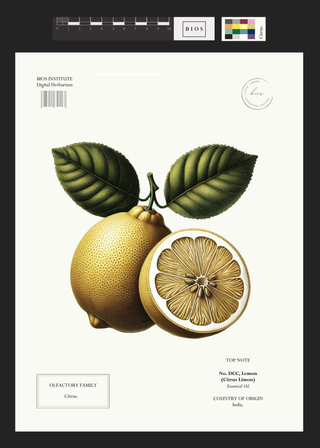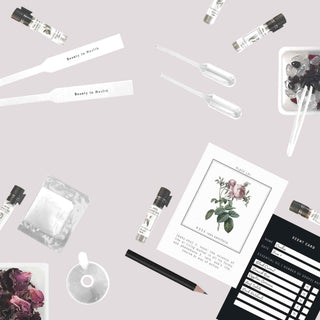

Citrus limon, commonly known as lemon, is native to Southeast Asia. It is believed to have originated in the region encompassing northern India and parts of China.
Lemons have a long history of cultivation and use in various parts of the world. They were introduced to the Mediterranean region, including countries such as Italy, where we source ours from, and Greece, around the 2nd century AD. From there, lemons spread to other parts of Europe and eventually to the Americas during the age of exploration.
Lemon's fragrance is characterized by its uplifting and invigorating qualities. It has a sharp, citrusy aroma with a strong tang and a slightly sweet undertone. The scent of lemon is often described as clean, crisp, and refreshing, making it a popular ingredient in perfumery.
Lemon is a Top note and found in our Citrus family. Its bright and zesty character serves as an excellent introduction, creating an instant burst of freshness. Lemon's invigorating and lively nature makes it suitable for both men's and women's fragrances, providing a crisp and energetic touch.
In perfumery, lemon is valued for its versatility and ability to enhance other fragrance notes. It blends well with a wide range of ingredients, allowing perfumers to create diverse scent profiles. Lemon pairs harmoniously with other citrus notes, such as bergamot, orange, and grapefruit, enhancing their brightness and adding depth. It also complements floral notes, like jasmine and neroli, providing a zesty and sparkling aspect.
Lemon is frequently used in various fragrance compositions, including citrus-based perfumes, colognes, and summer scents. Its fresh and uplifting scent is often associated with feelings of cleanliness, vitality, and a youthful spirit. Lemon fragrances are commonly used to evoke a sense of freshness, invigoration, and a carefree attitude.
In addition to its aromatic qualities, lemon essential oil is known for its potential therapeutic benefits. It is believed to have uplifting and mood-enhancing properties, helping to reduce stress, boost concentration, and promote a sense of clarity and focus. Lemon oil is commonly used in aromatherapy practices for its refreshing and stimulating effects.
Overall, lemon brings a vibrant and lively quality to perfumes. Its zesty and refreshing aroma, with its bright citrus character, adds a crisp and invigorating touch to fragrance compositions, making it a cherished ingredient in the world of perfumery.
Lemon is often associated with purification and cleansing energies. Its fresh and citrusy scent is believed to help clear negative energy, purify the environment, and cleanse the mind and body. Lemon is commonly used in rituals or ceremonies that aim to cleanse and purify the energy of a space or an individual. Lemon essential oil may be diffused, lemon slices may be placed in water, or lemon-infused water may be sprinkled or used to cleanse objects or ritual tools.
Lemon is sometimes used in rituals for spiritual protection. Its bright and uplifting nature is believed to create a positive and protective energy field. In some traditions, lemon may be placed near entrances or used as an ingredient in charm bags or amulets to ward off negative energies and provide spiritual protection. Lemon is also believed to repel evil spirits or negative influences.
Lemon can be offered as a symbolic gift in various rituals and ceremonies. Its vibrant color and invigorating scent make it a popular choice as an offering to deities, ancestors, or spiritual entities. Lemon may be placed on altars or shrines as a representation of purity, vitality, and a symbol of gratitude and abundance.
Lemon is sometimes used in ritual baths for cleansing and purification purposes. Adding lemon juice or lemon essential oil to bathwater is believed to remove stagnant energy, negativity, or emotional blockages. Lemon-infused baths can be used to refresh the body and spirit, promote clarity, and invite a sense of renewal.
Lemon may be incorporated into ritual tools or decorations as a symbolic element. Lemon slices or dried lemon peels may be placed on altars, used in wreaths, or added to ritual spaces as a representation of purification, freshness, and vitality. They can enhance the visual aesthetics and imbue the environment with the scent and energy of lemon.
Lemon
- Unit price
- /per
Please note this product format is a small vial that contains roughly 20 drops of scent concentrate. This can be purchased à la carte but is intended to be used with our Perfume Kit.
SCENT SPECIFICATIONS
Latin Name: Citrus Limonum
Extraction Method: Cold Pressed
Country of Origin: Italy
All of the scents in our library are naturally derived - our collection includes essential oils, absolutes, concretes, isolates, enfleurage, macerations, oleoresins, and mixed medium naturals.
Adding product to your cart
Citrus limon, commonly known as lemon, is native to Southeast Asia. It is believed to have originated in the region encompassing northern India and parts of China.
Lemons have a long history of cultivation and use in various parts of the world. They were introduced to the Mediterranean region, including countries such as Italy, where we source ours from, and Greece, around the 2nd century AD. From there, lemons spread to other parts of Europe and eventually to the Americas during the age of exploration.
Lemon's fragrance is characterized by its uplifting and invigorating qualities. It has a sharp, citrusy aroma with a strong tang and a slightly sweet undertone. The scent of lemon is often described as clean, crisp, and refreshing, making it a popular ingredient in perfumery.
Lemon is a Top note and found in our Citrus family. Its bright and zesty character serves as an excellent introduction, creating an instant burst of freshness. Lemon's invigorating and lively nature makes it suitable for both men's and women's fragrances, providing a crisp and energetic touch.
In perfumery, lemon is valued for its versatility and ability to enhance other fragrance notes. It blends well with a wide range of ingredients, allowing perfumers to create diverse scent profiles. Lemon pairs harmoniously with other citrus notes, such as bergamot, orange, and grapefruit, enhancing their brightness and adding depth. It also complements floral notes, like jasmine and neroli, providing a zesty and sparkling aspect.
Lemon is frequently used in various fragrance compositions, including citrus-based perfumes, colognes, and summer scents. Its fresh and uplifting scent is often associated with feelings of cleanliness, vitality, and a youthful spirit. Lemon fragrances are commonly used to evoke a sense of freshness, invigoration, and a carefree attitude.
In addition to its aromatic qualities, lemon essential oil is known for its potential therapeutic benefits. It is believed to have uplifting and mood-enhancing properties, helping to reduce stress, boost concentration, and promote a sense of clarity and focus. Lemon oil is commonly used in aromatherapy practices for its refreshing and stimulating effects.
Overall, lemon brings a vibrant and lively quality to perfumes. Its zesty and refreshing aroma, with its bright citrus character, adds a crisp and invigorating touch to fragrance compositions, making it a cherished ingredient in the world of perfumery.
Lemon is often associated with purification and cleansing energies. Its fresh and citrusy scent is believed to help clear negative energy, purify the environment, and cleanse the mind and body. Lemon is commonly used in rituals or ceremonies that aim to cleanse and purify the energy of a space or an individual. Lemon essential oil may be diffused, lemon slices may be placed in water, or lemon-infused water may be sprinkled or used to cleanse objects or ritual tools.
Lemon is sometimes used in rituals for spiritual protection. Its bright and uplifting nature is believed to create a positive and protective energy field. In some traditions, lemon may be placed near entrances or used as an ingredient in charm bags or amulets to ward off negative energies and provide spiritual protection. Lemon is also believed to repel evil spirits or negative influences.
Lemon can be offered as a symbolic gift in various rituals and ceremonies. Its vibrant color and invigorating scent make it a popular choice as an offering to deities, ancestors, or spiritual entities. Lemon may be placed on altars or shrines as a representation of purity, vitality, and a symbol of gratitude and abundance.
Lemon is sometimes used in ritual baths for cleansing and purification purposes. Adding lemon juice or lemon essential oil to bathwater is believed to remove stagnant energy, negativity, or emotional blockages. Lemon-infused baths can be used to refresh the body and spirit, promote clarity, and invite a sense of renewal.
Lemon may be incorporated into ritual tools or decorations as a symbolic element. Lemon slices or dried lemon peels may be placed on altars, used in wreaths, or added to ritual spaces as a representation of purification, freshness, and vitality. They can enhance the visual aesthetics and imbue the environment with the scent and energy of lemon.
